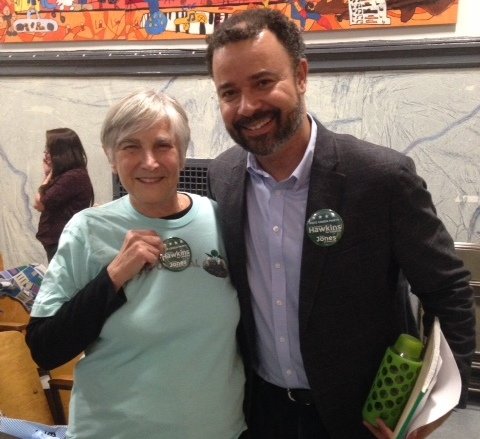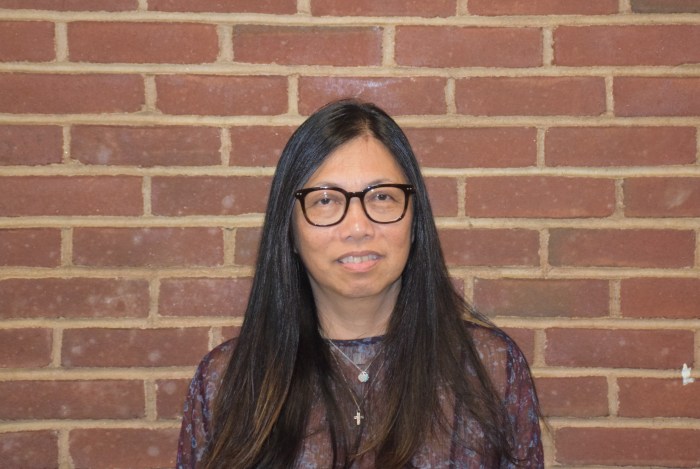
The much-anticipated Oct. 11 event at Brooklyn’s New School, dubbed “Changing the Conversation,” was the brainchild of the Network for Public Education, which was holding its first-ever Public Education Nation broadcast. While the crowd of about 200 were on hand to hear from several esteemed speakers, the event also offered people who had only conferred online the opportunity to meet in person for the first time. The most high-profile guest sat up front, a profile familiar to those who watch The Daily Show or keep up with the latest news in public education. In essence, every single person in the room.
Attendees packed the venue despite heavy rainfall for the opportunity to hear speakers take on subjects like “Authentic Reform,” testing and the Common Core, and charter schools in the wider context of what seems to be a complete public education overhaul that began when George W. Bush first signed No Child Left Behind into law and continued into President Obama’s Race to the Top initiative, which doles out funding for the Common Core education reform.
The speakers included such notable advocates for public education like Diane Ravitch, the prolific author of the national bestseller Reign of Error: The Hoax of the Privatization Movement and the Danger to America’s Public Schools, education professor and noted BAT (Badass Teacher’s Association member) Yohuru Williams, author of On the Same Track: How Schools Can Join the Twenty-First-Century Struggle against Resegregation and 2013’s New York Principal of the Year, South Side High School principal Carol Burris, Green Party candidate for lieutenant governor Brian Jones, and community activist Jitu Brown, among others.
The speakers held the audience of approximately 200, plus others watching via livestream on schoolhouselive.org, in rapt attention for more than five hours, as they built sharp critiques of the current state of public education toward a powerful finale that featured Ravitch and Brown in a deep conversation about students’ civil rights.
The panelists presented a united front in depicting the roots of the problems in education: wealthy benefactors, with little to no education experience, leading “reform” without the input of seasoned professionals. Teachers, principals, professors count themselves as troops on the ground, with significant insight into the issues within public education. They have no shortage of ideas as to how to fix them. However, it seems no one is asking them, these professionals say. Hence, Public Education Nation, which billed itself as “the voices of educators, parents and students, rather than billionaires, or those who echo their talking points,” according to education activist, NPE co-founder, and host Anthony Cody.
Coming out of the gate with a pointed criticism as an example of such a corporate takeover of public education, Yohuru Williams contended that you “cannot grow followers from Astroturf. In other words, fake grass roots.”
The speakers all echoed the theory put forth by Ravitch that public education is being undermined as part of a plan to eventually become privatized by corporate investors. The standardized tests, on which the Common Core depend to function, is a measure by which to find such deep fault within public education that, one by one, they will be forced to close. In their place, charters, funded by wealthy benefactors with their own regimes, and private schools will reign. This model appears to be playing out in such urban areas as Chicago and Philadelphia.
Brian Jones warned of such an eventuality for children.
“What’s at stake here is whether or not we’re going to have a robust, well-funded, high-quality system where people can just cross the threshold and receive the service for free and have the schools deploy whatever resources are necessary to meet the needs of that student as opposed to a selective, competitive system which will inevitably reproduce dramatic inequality we’re already seeing in our system,” Jones told the Press.
Both charters and private schools have no obligation to accept (or keep) students. Therefore, children with behavioral or learning disabilities could fall between the cracks, exacerbating an already wide achievement gap, experts said. The root of the problem, according to Jones, is poverty, which he believes can be addressed, instead of being passed onto schools to accommodate.
“Everybody who works in a school knows the difference between a child who’s homeless or bounced around, a child with no food in the refrigerator,” he said. “Then something happens, the parent gets a really good job and the child’s life stabilizes and transforms, and the child transforms. What they’re able to do transforms. I feel like as somebody who’s running for office who’s not in the classroom right now, I want to say there’s things we can do about poverty that should be part of the discussion about authentic reform in our schools.”
Jones suggests a minimum wage of at least $15 per hour, free tuition for all CUNY and SUNY schools, and a system where medical bills cannot bankrupt a family as the basis for what he considers “authentic reform” for schools, in the place of conforming curriculum and standardized testing to replicate equality.
“These aren’t crazy things to demand. This things exist on Planet Earth,” he added. He concluded that by sending some of the money used to develop standardized tests on resources for the schools, children would be immediately and positively affected.
“If we took the tens of millions of dollars that they’re taking to develop tests, it’s like as we speak right now, they’re developing a standardized music test. We haven’t even figured out how to put a music teacher in front of every child and yet we’ll spend all of this money for a music test?” he asked, to murmurs in the audience. “It’s upside down. We need to be able to direct the resources toward the things that we know the parents, students teachers, actually want in the schools: small class sizes, experienced teachers, and rich curricular experiences.”
The much anticipated finale featured Ravitch. The crowd greeted her with hearty applause and loud whoops of appreciation, especially when she read the oft-quoted Gandhi in saying, “First they ignore you. Then they laugh at you. Then they fight you. Then you win,” in reference to the education reformers who she contended “have so much money and so much power and they do control the US Department of Education, they do have all these foundations with billions of dollars and they have targeted particularly minority communities for devastation and in some cases, a land grab for gentrification.” She concluded that while the fight is long from reaching its eventual conclusion, there was good reason to feel optimistic, “because they keep talking about changing the narrative. Why? Because their narrative has failed.”
She noted that their fight for public education will be won, quite simply, because “we’re right and they’re wrong.” She argued that standardized tests measured little more than the wealth of one’s parents, than any “aptitude.”
“What I’m pulling for for all children of this country are the same learning conditions that are available and that the reformers choose for their children,” Ravitch told the crowd.
“What I’d love to see are opt outs everywhere. Universal opt out! What if they threw a test and nobody took it?” she asked to a cheering crowd. “When these children take these Common Core tests, their teachers are not allowed to see what their students got right and what they got wrong. They learn nothing from them. Which means the tests have no diagnostic value, which means they have no purpose whatsoever, which means we are paying millions of dollars to an industry which is doling out a worthless product and labeling our children as failures and setting our schools up for privatization.”
She contended that the reformers have targeted the urban communities of Los Angeles, St. Louis, Kansas City, Washington D.C., New Orleans, and Houston, among others, which are populated with people of color who do not have the “political power to fight back.”
Jitu Brown, an imposing figure with a booming orator’s voice, stole the entire show, if that is possible. He posed that the education reform that has deemed inner city schools as “failures” based on standardized test scores and systematically closed them as a profound civil rights violation that has literal life or death consequences.
He relayed the instance where school closing led to a child who had to cross a four lane highway in order to get to his new bus stop who’d been hit by a car and died, of school riots breaking out between incoming students deemed “project kids” by their new classmates, and of a kid killed in gang violence for standing on the wrong corner, in the wrong neighborhood, five miles from where his now-closed school had been.
“We’re not gonna win if we approach this as an intellectual fight,” he said. “This is a spiritual fight. Our work is to kill privatization. Not to negotiate with it. Not to play with it. Because when a child tugs on your pant leg because their school closed and the city dumped 250 of them in another school, and there’s 54 kindergarteners in a classroom and the cafeteria is so crowded that the children have to eat lunch in the gym, that’s not intellectual, that’s a child in a crucial part in their life.”
“We can’t be activists anymore,” he concluded. “We have to be organizers.”
Jitu’s vision is to mobilize an army of conscious constituents to action, to “draw a line in the sand and say, ‘Not one more child. Not one more school.’ ”
A standing ovation erupted long after the hard-fought words of those self-proclaimed advocates for public education left the stage. The hashtag #PublicEdNation trended on Twitter, and in clusters, online, and in person, activists organized and geared up for another round of battle. With Green Party pins attached to their vests, they look to Nov. 4 to vote their conscious.



































